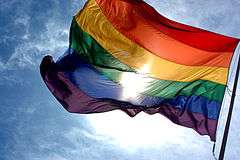Trikone

Trikone (Hindustani pronunciation: [t̪rɪˈkoːn]) is a non-profit support, social, and political organization for South Asian bisexual, lesbian, gay, and transgender people.[1][2][3] It was founded in 1986 in the San Francisco Bay Area and is one of the oldest group of its kind in the world.[4][5][6] South Asians affiliated with Trikone are from or trace their ancestry to the following countries: Afghanistan, Bangladesh, Bhutan, India, Maldives, Burma, Nepal, Pakistan, Sri Lanka, and Tibet.[7] Trikone publishes an eponymous magazine with an international base of subscribers several times a year.[8] The magazine is the oldest south Asian LGBT magazine in the U.S. which is completed 27 years in the mainstream media.[9]
Several metropolitan areas in North America aside from the San Francisco Bay Area also have organizations named "Trikone" (such as Trikone Northwest and Trikone Michigan), which have similar missions.[10]
History and activities
The organization was co-founded in 1986 by Arvind Kumar and Suvir Das with the name "Trikon" and the first newsletter was published with that name in January 1986. (The name was later changed to "Trikone" due to a name conflict with an unrelated organization, "Tricon.") Following media coverage in both the United States and India, a group soon formed to continue the publication of the newsletter and to participate in local events such as the San Francisco Gay & Lesbian Pride Parade.[11][12]
In 2000 and 2006: DesiQ, a South Asian queer conference of international scope was produced by the organization.[13] In September 2001 QFilmistan, a film festival, was also produced.[14]
About the name
"Trikone" (Hindi/Marathi/Sanskrit: त्रिकोण, Telugu: త్రికోణ్, Urdu: تْرِكون, Gujarati: ત્રિકોણ, Punjabi: ਤ੍ਰਿਕੋਣ, Bengali: ত্রিকোণ, Malayalam: ത്രികോൺ) means "triangle"[15] in many South Asian languages. The pink triangle is a historical symbol employed in gay liberation movements.
Women of Trikone
Women of Trikone is a sub group and also has separate a list-serve for queer women of South Asian descent from the Bay Area.[16]
See also
References
- ↑ Atkins, Dawn, ed. Looking queer: Body image and identity in lesbian, bisexual, gay and transgender communities. Psychology Press, 1998.
- ↑ Leong, Russell, ed. Asian American sexualities: Dimensions of the gay and lesbian experience. Psychology Press, 1996.
- ↑ Shah, Nayan. "9. Sexuality, Identity, and the Uses of History." Q and A: Queer in Asian America (1998): 141.
- ↑ Vanita, Ruth. "Lesbian Studies and Activism in India." Journal of Lesbian Studies 11.3-4 (2007): 244-253.
- ↑ "About Trikone". Retrieved 2008-02-02.
- ↑ Ramakrishnan, L. "Putting the'B'Back in LGBT: Bisexuality, Queer Politics and HIV/AIDS Discourse." (2006).
- ↑ Balachandran, Chandra S. "A preliminary report on emerging gay geographies in Bangalore." South Asia: Journal of South Asian Studies 24.s1 (2001): 103-118.
- ↑ "Trikone magazines". Retrieved 2008-02-02.
- ↑ Parasar, Anuradha. "Homosexuality In India–The Invisible Conflict."
- ↑ Jeung, Russell. "RELIGIOUS IDENTITY AND MARGINALIZATION." Encyclopedia of Asian American Issues Today 1 (2010): 457.
- ↑ "Minority Gays Create a Voice for Unserved Community". Retrieved 2008-02-04.
- ↑ Kumar, Arvind (2008-02-11). (Interview). Interview with Arvind Kumar. Missing or empty
|title=(help) - ↑ "LGBT Pride Celebrations". Retrieved 2008-02-02.
- ↑ "QFilmistan: The first South Asia LGBT film festival". Retrieved 2008-02-02.
- ↑ Platts, John (1884). A dictionary of Urdu, classical Hindi, and English. London: W. H. Allen & Co. p. 319. ISBN 81-215-0098-2.
- ↑ Women-of-Trikone
External links
- Trikone Bay area email lists
